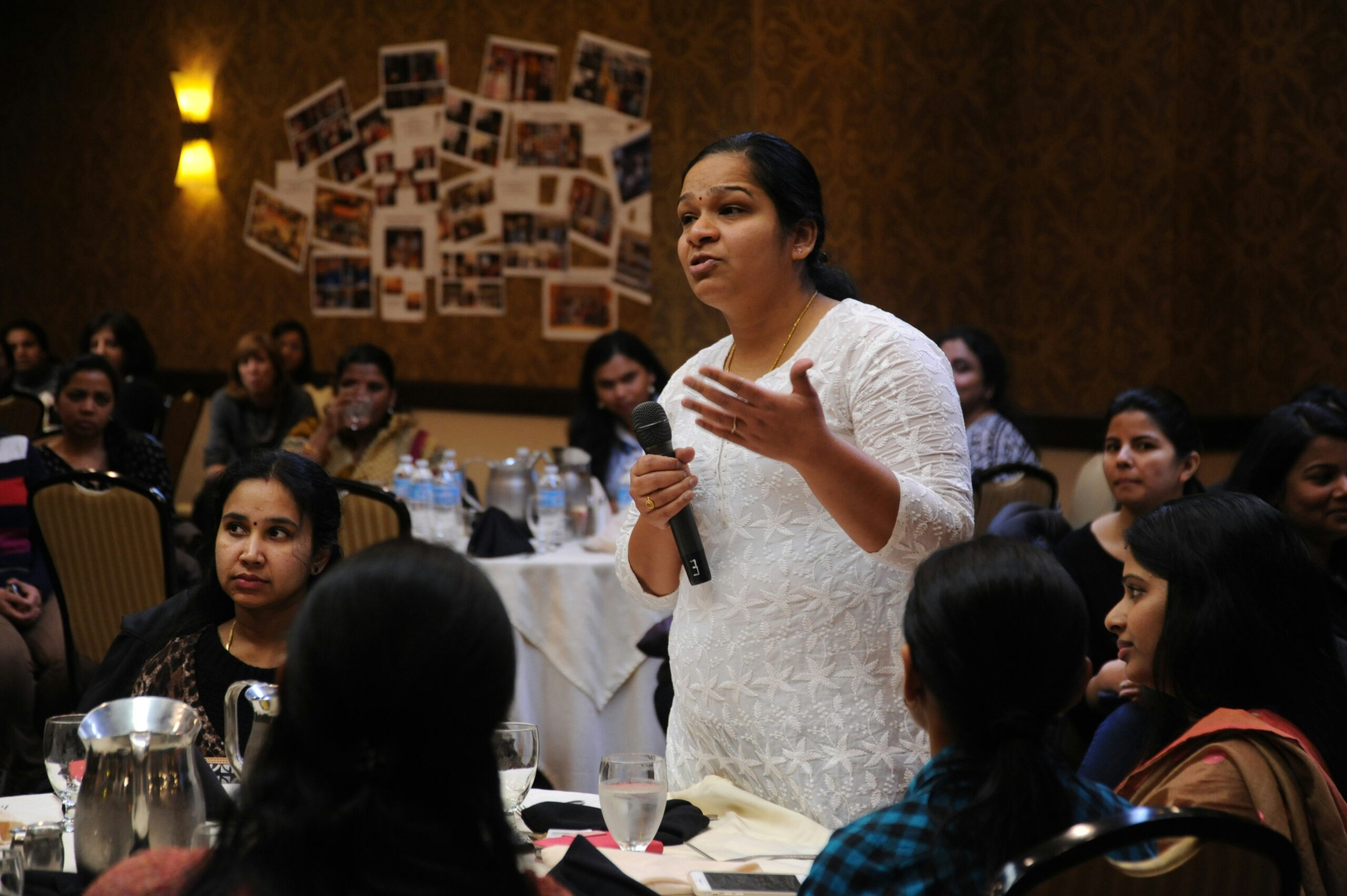Are you serious?
“For some the expression ‘serious games’ appears to be a contradiction. Are games not fun by definition and hence not serious? On the other hand, one could argue that all games are serious. Play and games have an evolutionary background as instruments for survival training and in most cases the players take the games they play seriously. Depending on the definitions of ‘serious’ and ‘game’, ‘serious games’ can be considered an oxymoron or a tautology.”
(Breuer J., Bente G., 2010)
This serious game (SG) was created by a survivor and former shelter advocate to provide a platform for a deliberative discussion about domestic violence. The scenarios were thoughtfully crafted to elaborate on this wicked problem, extrapolating on the tensions inherent throughout these victim experiences.
This is an example of “Thick Participation” as described by Nabatchi and Leighninger:
“An underappreciated type of thick participation is the category of ‘serious games’ that simulate real‐world events to educate users and sometimes solve problems … Although a serious game may be entertaining, amusement is not its primary objective; rather, a serious game is intended to ‘further government or corporate training, education, health, public policy, and strategic communication objectives’… Serious games are sometimes used as discrete exercises within thick participation processes. Others are standalone processes that include large numbers of people in deliberation, role‐playing, and competition.”
2015
In You Choose Abuse: The Game, participants are asked to earnestly contemplate their reactions to situations that depict the lived experiences of victims. Facilitating activities and offering the “players” a small sliver of control over the outcomes requires the participants to exercise their problem-solving skills from the perspective of the victim. Supplemental materials are used to provide context and encourage the player to identify with the character.
Interstitials between each scenario help illustrate the nuances and intersecting factors that influence decision-making. Educational resources such as the Duluth Model Power and Control Wheel promote a baseline level of understanding, and statistics and testimonials provide depth.
While this SG could be completed solo, it was developed to be explored as a group with a trained facilitator. “Learning is a complex activity that requires graduality and needs several steps, that have to be supported by various tools (e.g., paper and digital, reading and writing, etc.) and generally have to be guided, possibly by a real adult, in order to be meaningful/compelling for the learner and not to waste time and energies.” (Bellotti F. Berta R. De Gloria A., 2010, p25)
Players
Case Conferences and Debriefing Sessions
This virtual platform can host virtual case conferences and debriefing sessions where professionals come together to discuss complex cases, review intervention strategies, and identify areas for improvement. These sessions provide an opportunity for interdisciplinary collaboration, reflective practice, and ongoing professional development.
The SG can present participants with ethical dilemmas commonly encountered in domestic violence cases, such as confidentiality concerns, cultural considerations, and balancing safety with autonomy. Through facilitated discussions, participants can explore the ethical dimensions of these dilemmas and develop strategies for navigating them in their professional practice.
This digital environment can serve as a medium for peer consultation and support, allowing professionals to seek input from colleagues, share best practices, and debrief challenging cases. By connecting with peers, participants can access a diverse range of perspectives and expertise.
Training Service Providers, Volunteers, and Others
The SG can offer skill-building activities that focus on key competencies required for working with survivors of domestic violence, such as active listening, crisis intervention, safety planning, and trauma-informed care. Trainees can practice these skills through simulated interactions with virtual survivors, receiving feedback and guidance along the way
The virtual world can include modules specifically designed to address cultural competency and sensitivity in working with diverse populations. Trainees can explore issues related to race, ethnicity, gender identity, sexual orientation, and socioeconomic status, learning how to provide inclusive and culturally responsive services to all survivors.
Trainees can receive education on relevant laws, policies, and procedures related to domestic violence, including reporting requirements, protective orders, and access to legal resources. The virtual world can provide interactive resources, case studies, and quizzes to reinforce understanding and promote compliance with legal obligations.
Development Process
There are models available to inform the development of this SG. Ernesto Pacheco-Velazquez et al. reviewed many approaches, but this theory from Silva was used for this process.

“Silva explains that the steps represented by a rounded rectangle are related to learning mechanisms or learning outcomes, while the other rectangles are associated with game features. He adds that the dashed lines signify iterative loops, where the mechanics can be refined based on user experience or learning outcomes.”
(2023, p 60)
This game started as an outline of issues that complicate the experiences of victims, with a deliberate emphasis on vulnerable groups. Each scenario presents players with two deliberative tensions – click here to read more about how this SG was developed to promote deliberative practice. Because this game is in beta testing, the outcomes and possible story arcs are underdeveloped, and could benefit from further development that will be discussed in the next section.
To get an idea of the story, the possible selections were drafted and a very brief follow-up was written, then the narrative was written last. Some scenarios were intentionally ambiguous and made ripe for disagreement. The vignettes were purposefully written to be concise to prevent player fatigue.
Literature Review
Integrating literature reviews within the game can offer players insights into the complexities of domestic violence. These reviews can include studies, statistics, and expert opinions on various aspects of domestic violence, including the argument for decriminalizing domestic violence. By presenting this information in an accessible format, players can gain a deeper understanding of the issue, potentially challenging misconceptions and increasing awareness.
Testimonials
Testimonials from survivors, advocates, and professionals working in the field of domestic violence can add a layer of authenticity to the game. These testimonials can be presented through in-game documents, audio recordings, or interactive dialogue sequences, allowing players to hear firsthand accounts of individuals affected by domestic violence. By incorporating real-life experiences, the game can evoke empathy and create a more immersive and emotionally resonant experience for players
Tasks
Tasks were added throughout the game to require participants to actively engage with tasks that victims experience, such as finding online resources and contacting a hotline. Participants also get to perform tasks that service workers in the community may provide, such as responding to the hotline and writing an affidavit.
Future Development
This SG has the potential to be further developed into a more interactive and complex virtual world that allows for deeper engagement.
Virtual World Environment
The game could be expanded into a fully immersive virtual world where players can create avatars and interact with each other. This environment could simulate various locations relevant to the theme of domestic violence, such as homes, shelters, support groups, legal offices, and community centers.
Expanded Storylines
In addition to the core narrative of experiencing domestic violence, the expanded game could offer multiple storylines and scenarios that explore different aspects of the issue. Players could choose to play as survivors, abusers, friends/family members, or even professionals such as therapists or law enforcement officers. Each storyline would offer unique challenges and perspectives, allowing players to gain a deeper understanding of the complexities involved.
Complex Financial Transactions
To add realism and depth to the gameplay, the virtual world could include economic elements such as managing finances, finding employment, accessing resources like shelters or legal aid, and dealing with financial dependence or abuse. Players could navigate these challenges while also dealing with the emotional and physical repercussions of domestic violence.
Interactive Activities
The virtual world could offer a wide range of interactive activities designed to educate and engage players. These could include role-playing scenarios, educational workshops, support group meetings, interactive simulations of real-life situations, and mini-games that test players’ knowledge and problem-solving skills related to domestic violence.
Community Building and Support
One of the key benefits of a virtual world experience is the opportunity for community building and support. Players could connect with others who have shared experiences, share resources and coping strategies, and provide mutual support in a safe and anonymous environment. This sense of community could be facilitated through features such as forums, chat rooms, and virtual events.
Educational Resources
To further enhance the educational value of the game, it could include access to resources such as informational articles, videos, quizzes, and links to real-life support services. This would empower players to learn more about domestic violence, its causes and consequences, and available avenues for help and support.
Virtual Group Sessions
Instead of individual gameplay, the virtual world could host group sessions where players collaboratively navigate scenarios related to domestic violence. These sessions could be moderated by facilitators trained in the subject matter, ensuring that discussions remain respectful and productive.
Diverse Perspectives
The game could encourage players to take on different roles within each scenario, such as survivors, abusers, friends/family members, or professionals. By experiencing the story from multiple perspectives, players gain insight into the varied challenges and motivations involved in domestic violence situations
Feedback and Continuous Improvement
Throughout the game experience, players’ feedback and insights could be collected to inform ongoing development and refinement. This iterative approach ensures that the game remains relevant, engaging, and effective in promoting meaningful dialogue and social change.
Bellotti, F., Berta, R., & de Gloria, A. (2010). Designing effective serious games: Opportunities and challenges for research. International Journal of Emerging Technologies in Learning, 5(SPECIAL ISSUE 2), 22–35. https://doi.org/10.3991/ijet.v5s3.1500
Breuer, J., & Bente, G. (2010). Why so serious? On the relation of serious games and learning. In Journal for Computer Game Culture (Vol. 4, Issue 1). https://hal.science/hal-00692052
Nabatchi, T., & Leighninger, M. (2015a). Good or Bad? Charming or Tedious? Understanding Public Participation.





1 comment
Trinity
I like the explanation of a serious game. I had never heard of this before but I think that it is a very good tool!